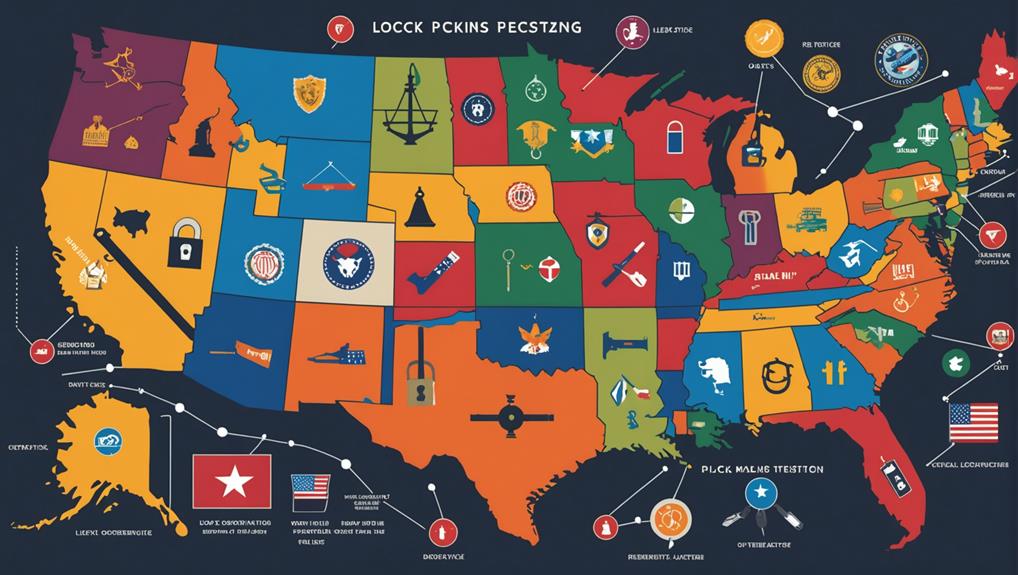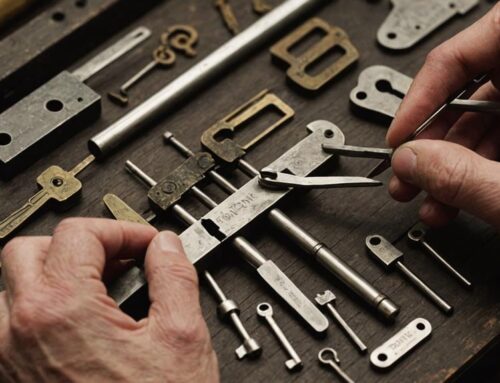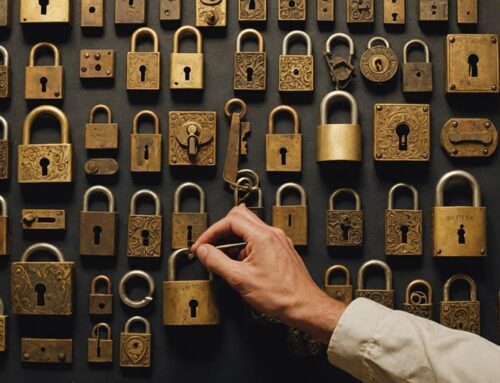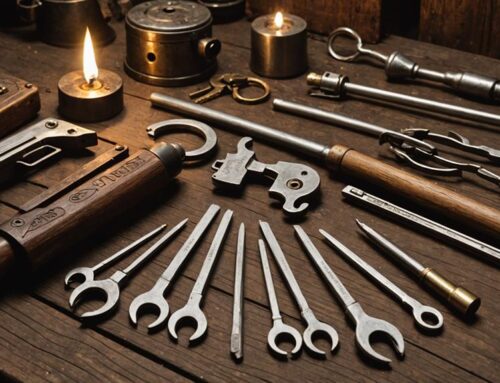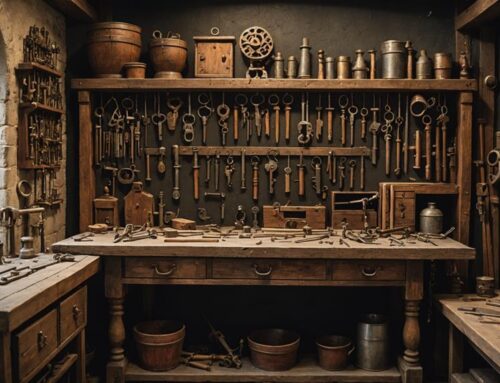If you're exploring lock picking, grasp the legal rules across states to steer clear of trouble. In most states like Alabama, California, and Florida, having lock picking tools with criminal intentions is a no-go. Unauthorized tool use on another's property is trespassing and could land you in legal hot water. Stay on the right side of the law by using lock picking tools responsibly and lawfully, whether for locksmithing or with consent. Familiarizing yourself with these regulations is key to avoid potential legal ramifications. Understanding state-specific laws will help you navigate the intricate legal landscape of lock picking.
Key Takeaways
- Possession of lock picking tools is illegal for criminal purposes in states like Alabama, California, and Florida.
- Lock picking tools can be owned for legitimate reasons, such as locksmithing, with property owner consent.
- Awareness of state-specific regulations is crucial to avoid legal issues when possessing lock picking tools.
- Licensed locksmiths and authorized individuals can use lock picking tools for professional or educational purposes.
- Responsible and ethical usage of lock picking tools is essential to comply with state regulations.
Alabama Lock Picking Regulations
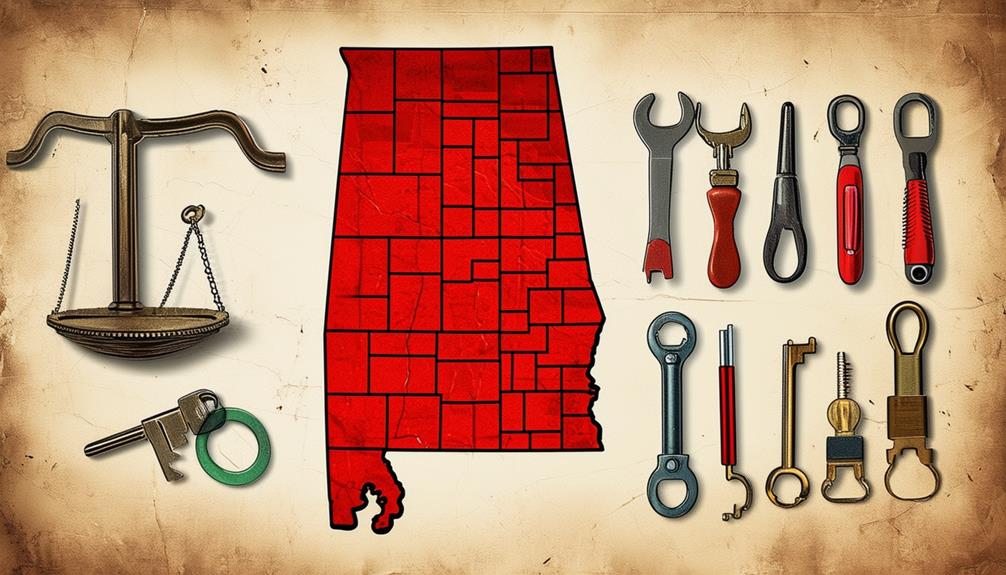
When it comes to lock picking in Alabama, it's important to be aware of the legal regulations in place. In Alabama, the laws surrounding lock picking are quite strict, and they reflect a broader concern for property security and privacy.
The act of possessing lock picking tools with the intent to use them for unlawful purposes is illegal. Consequently, it's vital to only engage in lock picking activities where you have explicit permission to do so, such as when practicing as a locksmith or in other lawful circumstances. For more detailed information on this topic, read about state-specific laws.
While lock picking itself isn't explicitly illegal in Alabama, using lock picking tools to gain unauthorized access to someone else's property is considered a criminal offense. It's important to always respect others' privacy and property rights.
Additionally, carrying lock picking tools in certain circumstances, such as during the commission of a crime, can lead to severe legal consequences.
To stay on the right side of the law in Alabama, it's advisable to only use lock picking tools responsibly and within the boundaries of the law. Always make sure you have the necessary permissions before attempting to pick a lock, and never engage in any activities that could be deemed unlawful.
California Lock Picking Laws

In California, understanding the laws regarding lock picking is vital for staying compliant with the legal framework.
California lock picking laws prohibit the possession of lock picking tools with the intent to commit a burglary or any other crime. Under California Penal Code Section 466, it's illegal to possess burglary tools, which include lock picks, with the intent to use them for unlawful purposes.
However, it's significant to recognize that owning lock picking tools for legitimate purposes, such as locksmithing or hobbyist activities, is generally allowed as long as there's no intent to use them for criminal activities. For more insights on this topic, refer to the legal aspects of lock picking to guarantee you're well-informed.
If you're found in possession of lock picking tools under circumstances that suggest criminal intent, you could face serious legal consequences in California.
It's vital to be aware of the specific regulations in your area and guarantee that you're using lock picking tools responsibly and lawfully to avoid any potential legal issues.
Florida Lock Picking Statutes
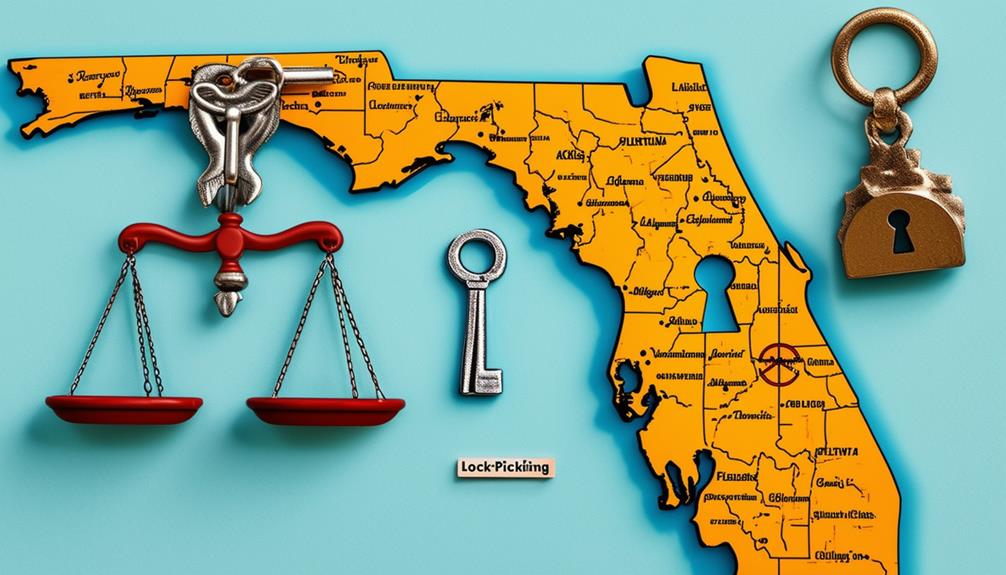
Understanding the legal landscape surrounding lock picking in Florida is vital for ensuring compliance with state regulations. In Florida, lock picking statutes fall under Chapter 810 of the Florida Statutes, which covers various aspects of burglary and trespassing.
According to these laws, individuals must be aware of the potential repercussions of engaging in such activities, as even the possession of tools deemed suspicious can raise legal concerns. Under these statutes, possessing lock picking tools with the intent to use them unlawfully is considered a criminal offense. Florida law prohibits the possession of lock picks, bump keys, or other burglary tools with the intent to commit a crime, such as breaking and entering.
Engaging in lock picking activities without proper authorization can lead to serious legal consequences in Florida.
It's important to note that in Florida, locksmiths and individuals authorized by property owners are exceptions to these regulations when possessing lock picking tools for legitimate purposes.
However, for the general public, owning or using lock picking tools without lawful justification is illegal and can result in criminal charges. As a result, it's imperative to be aware of Florida's lock picking statutes to avoid any potential legal issues.
For further details on state regulations, you can refer to lock picking laws.
Illinois Lock Picking Rules
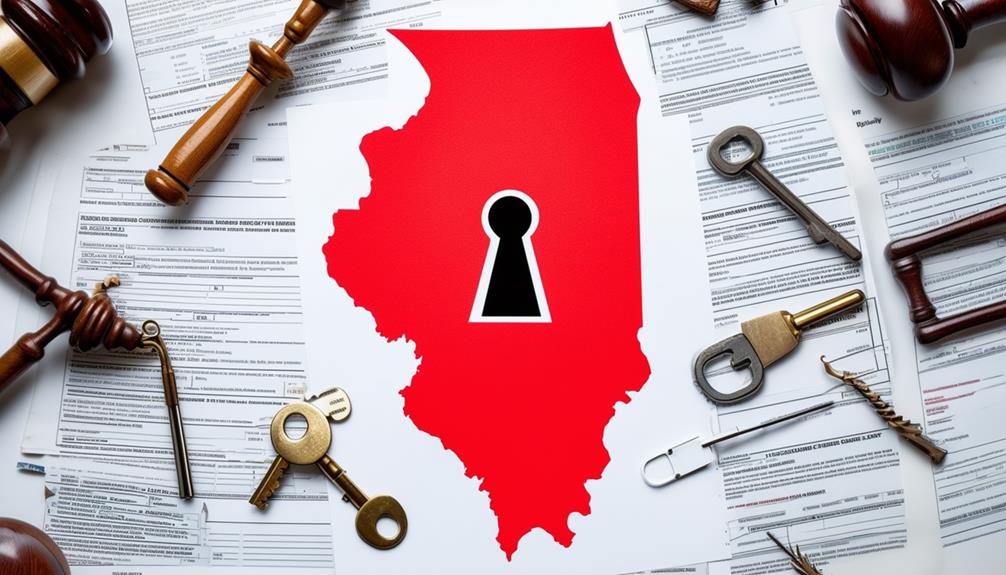
To navigate the legal aspects of lock picking in Illinois, individuals must be aware of the regulations outlined in the state statutes. When engaging in lock picking activities in Illinois, it's vital to adhere to the following rules to guarantee compliance with the law.
Understanding the importance of selecting a reliable locksmith can also be beneficial in legal scenarios, as a trustworthy professional can provide guidance on verifying credentials and experience.
- Possession of Lock Picking Tools: In Illinois, it's illegal to possess lock picking tools with the intent to use them for unlawful purposes.
- Lock Picking for Lawful Purposes: Lock picking is allowed in Illinois if it's done with the consent of the property owner or for locksmithing purposes.
- Professional Licensing: Individuals offering locksmith services in Illinois must comply with the state's licensing requirements.
- Penalties for Unlawful Lock Picking: Violating Illinois lock picking rules can lead to criminal charges, fines, and potential imprisonment.
Understanding the Illinois lock picking rules is essential to avoid legal repercussions. By following these regulations, individuals can engage in lock picking activities within the boundaries of the law in Illinois.
Massachusetts Lock Picking Guidelines
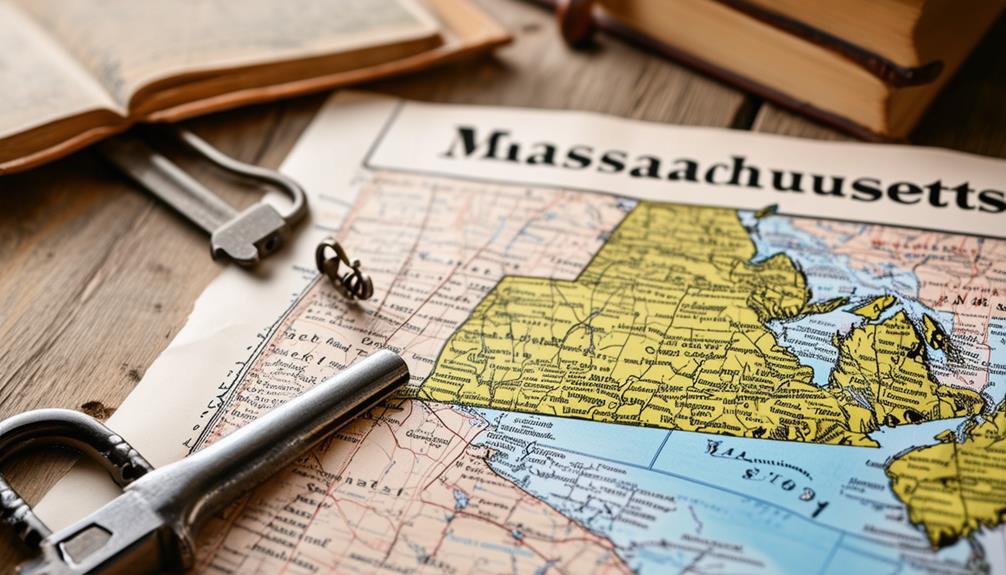
When engaging in lock picking activities in Massachusetts, it's vital to be familiar with the guidelines set forth by the state.
In Massachusetts, lock picking tools are legal to possess and use as long as there's no intent to commit a crime. However, if you're found in possession of lock picking tools during the commission of a crime, it can lead to additional charges.
It's important to remember that using lock picking tools on someone else's property without permission is considered illegal entry and could result in criminal charges.
Navigating legal risks effectively is key for enthusiasts. Massachusetts lock picking guidelines emphasize the importance of obtaining explicit permission before attempting to pick a lock.
Whether you're a locksmith or a hobbyist, always make sure you have the property owner's consent before engaging in any lock picking activities.
Additionally, it's wise to carry identification and be prepared to provide information about your intentions if questioned by law enforcement.
New York Lock Picking Requirements

Lock picking enthusiasts in New York must be aware of the specific legal requirements governing the possession and use of lock picking tools in the state.
When it comes to New York lock picking requirements, here are some key points to keep in mind:
1. Possession: It's legal to own lock picking tools in New York, but they shouldn't be carried with the intent to commit a crime.
It's important to guarantee that your activities align with ethical practices in the craft, as discussed in ethical considerations.
2. Use: Lock picking tools can be used by locksmiths, law enforcement, and individuals who've the consent of the property owner.
3. Restrictions: Using lock picking tools on locks that you don't own or have permission to access is illegal and considered criminal possession of burglar's tools.
4. Penalties: Violating the regulations regarding lock picking tools in New York can lead to criminal charges and potential legal consequences.
Understanding and adhering to these regulations is essential to guarantee that your lock picking activities in New York are conducted legally and ethically.
Texas Lock Picking Restrictions
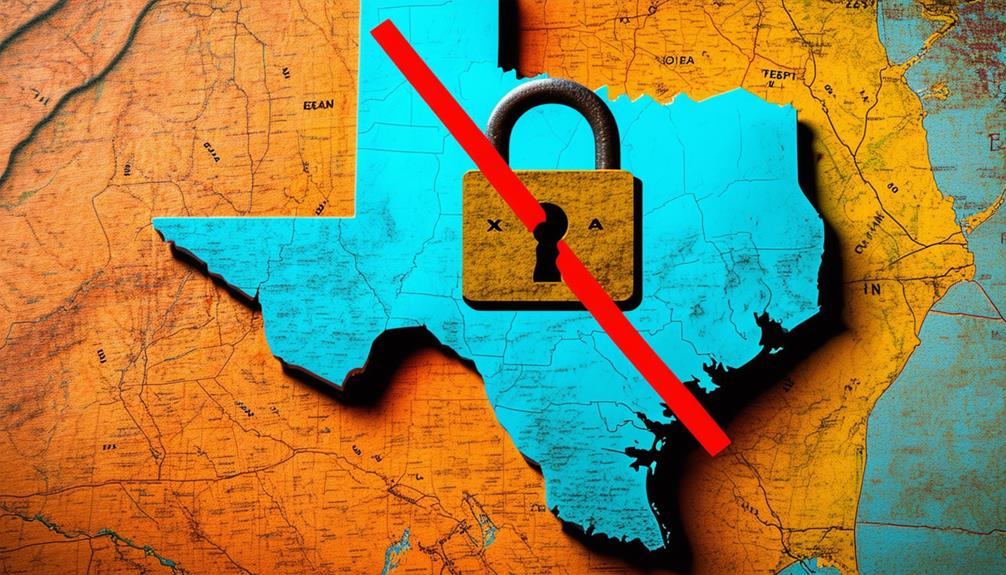
Amidst the diverse legal landscape surrounding lock picking across different states, it's vital for lock picking enthusiasts in Texas to grasp the specific restrictions governing the possession and utilization of lock picking tools in the state.
Familiarizing yourself with safe practices for all can enhance your understanding of ethical lock picking. In Texas, the possession of lock picking tools is legal as long as there's no malicious intent.
However, it's important to note that the tools shouldn't be carried around with the intention of using them for unlawful activities such as breaking and entering. If caught using lock picking tools for criminal purposes in Texas, you could face severe legal consequences, including fines and potential jail time.
It's important to use lock picking tools responsibly and only in situations where you have explicit permission to do so, such as when engaging in locksmithing activities or for educational purposes.
Understanding and adhering to the Texas lock picking restrictions will help guarantee that you stay on the right side of the law and enjoy your lock picking hobby without any legal issues.
Colorado Lock Picking Prohibitions
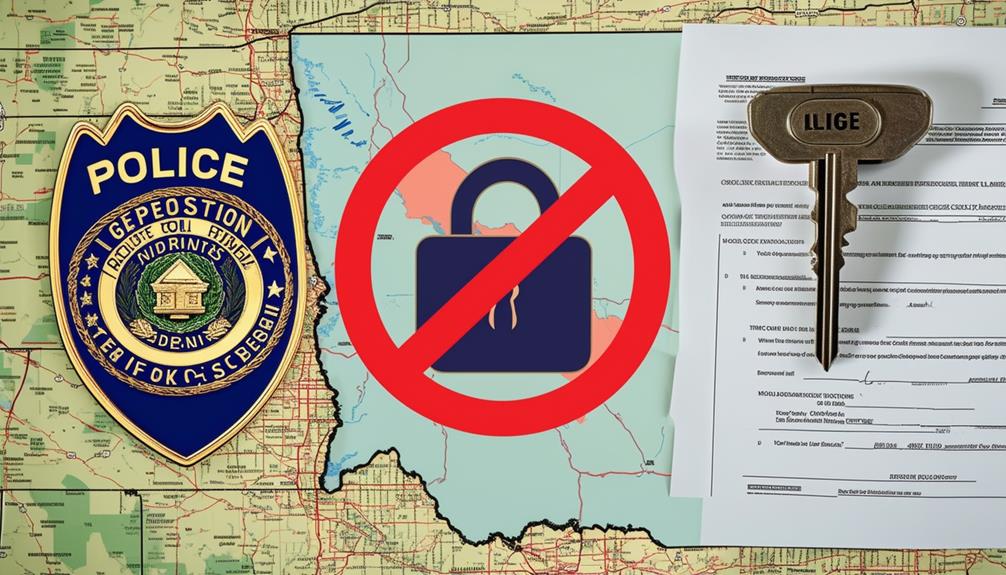
Within the legal framework of Colorado, individuals engaging in lock picking should be aware of the specific prohibitions regarding the possession and use of lock picking tools in the state.
It's vital to understand the mechanics of locks and the implications of using lock picking skills unlawfully; consequently, gaining knowledge about safety and ethical considerations is paramount.
When it comes to Colorado lock picking prohibitions, here are some key points to keep in mind:
- Possession of lock picking tools: It's illegal to possess lock picking tools with the intent to use them for unlawful purposes in Colorado.
- Use of lock picking tools: Using lock picking tools to gain unauthorized access to someone else's property without their consent is strictly prohibited.
- Manufacturing and distribution: Manufacturing or distributing lock picking tools with the knowledge that they'll be used for criminal activities is against the law in Colorado.
- Exceptions: There are certain exceptions for locksmiths and individuals who've valid reasons for possessing lock picking tools, such as for professional purposes or personal use with lawful intent.
Remember that understanding and abiding by Colorado's lock picking prohibitions is vital to avoid potential legal consequences in the state.
Oregon Lock Picking Codes
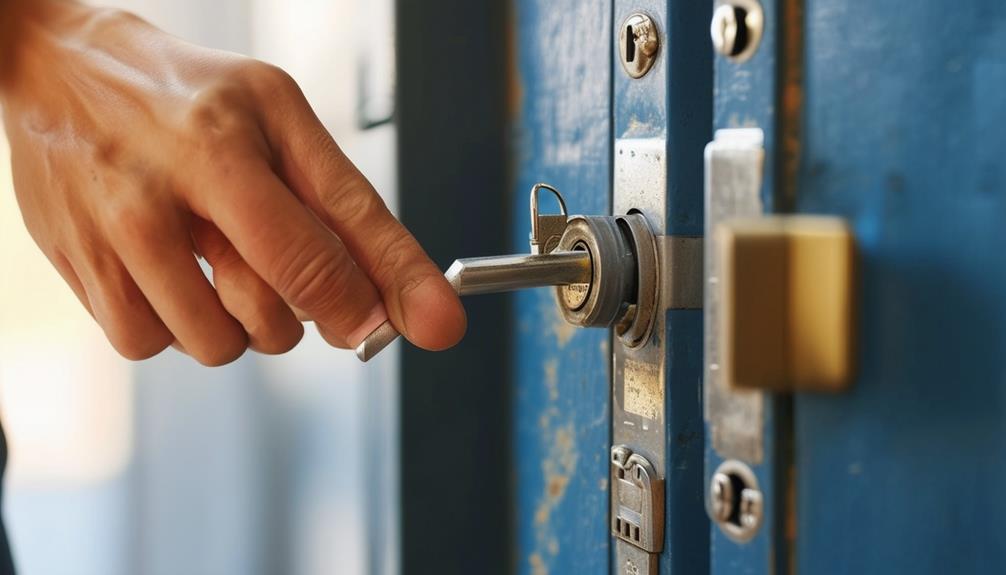
Maneuvering the legal landscape of lock picking extends beyond Colorado, leading us to examine the specific regulations in Oregon. In Oregon, lock picking codes are defined under Oregon Revised Statutes Section 165.412. This statute outlines that it's illegal to possess lock picking tools with the intent to commit a crime, such as burglary.
However, it's important to note that owning lock picking tools for legitimate purposes, such as locksmithing or hobbyist activities, is generally permitted in Oregon. Engaging in lock picking as a responsible hobbyist requires a clear understanding of your intentions and ethical considerations, which can help foster a positive community among enthusiasts. Understanding the significance of ethical practices in lock picking can further guide your actions.
Under Oregon law, engaging in unauthorized entry into a motor vehicle, building, or dwelling using lock picking tools is considered a criminal offense. The possession of lock picking tools with the intent to use them unlawfully can result in criminal charges and penalties.
As a result, if you're in possession of lock picking tools in Oregon, it's vital to verify that you're using them in a lawful and ethical manner to avoid any legal repercussions.
Understanding the specific regulations surrounding lock picking in Oregon is essential to stay compliant with the law and avoid potential legal issues. By being aware of Oregon's lock picking codes, you can engage in lock picking activities responsibly and lawfully within the state.
Washington Lock Picking Legislation
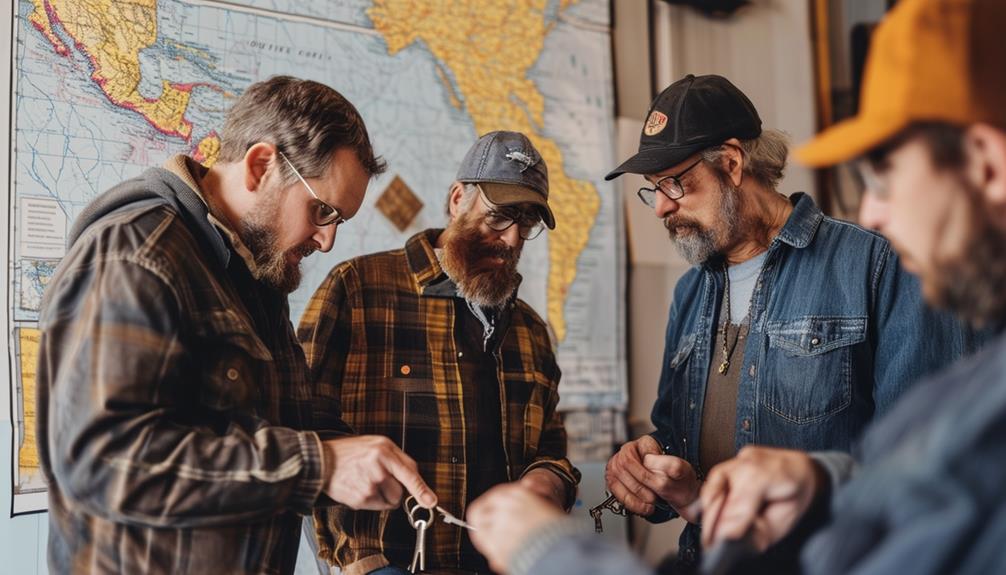
Washington Lock Picking Legislation is essential to understand if you reside or operate in the state.
Familiarizing yourself with Washington Lock Picking Laws can help you engage in ethical practices, as these laws outline what's considered acceptable in the domain of lock picking.
By learning about ethical lock picking techniques, you can guarantee that your lock picking activities remain within legal boundaries.
Knowing what constitutes permissible lock picking activities can help you avoid any potential legal issues in the state.
Washington Lock Picking Laws
Lock picking laws in Washington regulate the possession and use of lock picking tools within the state. If you're interested in lock picking in Washington, here's what you need to know:
1. Possession of Lock Picking Tools: In Washington, it's illegal to possess lock picking tools with the intent to commit a crime.
However, owning these tools for lawful purposes like locksmithing or hobbyist activities is generally allowed.
2. Use of Lock Picking Tools: Using lock picking tools to unlawfully enter someone else's property constitutes a crime in Washington.
Always guarantee you have explicit permission before attempting to pick a lock.
3. Penalties for Illegal Possession or Use: Violating Washington lock picking laws can lead to criminal charges, fines, and even imprisonment, depending on the circumstances of the offense.
4. Legal Lock Picking Activities: Engaging in lock picking as a hobby, for educational purposes, or as a licensed locksmith is typically permitted in Washington as long as it's done within the boundaries of the law.
Permissible Lock Picking Activities
Engage in legal lock picking activities in Washington by ensuring your actions align with state regulations. Washington state lock picking regulations permit the practice of lock picking only under specific circumstances. It is essential to be aware of these regulations to avoid any legal complications.
To provide a clear understanding, here is a table outlining permissible lock picking activities in Washington state:
| Permissible Activities | Restrictions |
|---|---|
| Locksmith Work | Requires proper certification and licensing |
| Personal Use | Only allowed on locks you own or with permission |
| Law Enforcement | Can be done by authorized personnel |
Frequently Asked Questions
Can Minors Legally Possess Lock Picking Tools?
Yes, minors can legally possess lock picking tools in some states, but regulations vary.
It's essential to check your state laws to guarantee compliance. Having these tools doesn't mean they can be used irresponsibly.
Using them without proper consent or for illegal purposes can lead to serious consequences.
Stay informed and always prioritize safety and legality when handling lock picking tools, regardless of your age.
Are There Specific Restrictions on Lock Picking in Public Places?
In public places, specific restrictions on lock picking vary.
It's crucial to be aware of local laws governing the possession and use of lock picking tools. Some areas may have laws prohibiting the use of such tools in public spaces, while others may allow it under certain circumstances.
Always make sure to understand the regulations in your area to avoid any legal issues when engaging in lock picking activities outside of private settings.
Are There Any Exceptions for Locksmiths or Security Professionals?
Yes, exceptions exist for locksmiths and security professionals when it comes to lock picking regulations.
These professionals typically have legal authorization or licensing to possess and use lock picking tools in their line of work.
While the general public may face restrictions, locksmiths and security experts are often allowed to use these tools in specific situations to provide their services or guarantee security measures are in place.
What Are the Penalties for Violating Lock Picking Regulations?
If you break lock picking rules, penalties vary by state.
Consequences can range from fines to jail time, depending on where you are. It's essential to know the laws in your area to avoid trouble.
Stay informed to steer clear of any legal issues related to lock picking. Be cautious and follow the regulations to protect yourself from facing penalties.
Do These Regulations Apply to Electronic Lock Picking Devices?
Do regulations apply to electronic lock picking devices? Yes, they do.
Many states consider electronic lock picking devices under the same laws governing traditional lock picking tools.
It's essential to understand the specific regulations in your state to avoid legal consequences.
Conclusion
Now that you're aware of the varying state regulations on lock picking, remember to always stay informed and follow the laws in your area. It's essential to understand the legal side of this skill to avoid any potential consequences. Stay safe, stay knowledgeable, and always be mindful of the laws in place. Who knows what surprises may await you if you're not careful…

